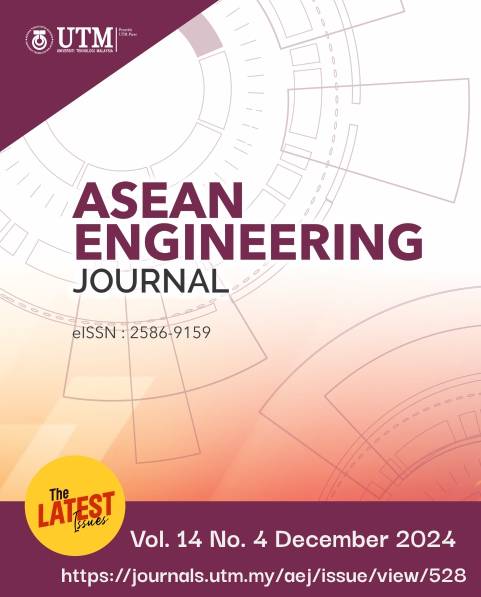REMOVAL OF TETRACYCLINE IN AQUEOUS SOLUTION USING KOH TREATED DIATOMACEOUS EARTH
DOI:
https://doi.org/10.11113/aej.v14.21957Keywords:
adsorption, diatomaceous earth, isotherm, kinetics, tetracycline, regenerationAbstract
Contamination of tetracycline group antibiotics (TC) has become more serious environmental problem. Diatomaceous earth (DE) activated by KOH impregnation is one of feasible adsorbents applied to TC removal. This paper aims to find the suitable condition for KOH activation, to investigate the adsorption behavior of DE activated at this condition (BDE), to regenerate the spent BDE (SBDE), as well as, to evaluate reusability of the regenerated BDE (RBDE). By comparing adsorption capacities (qTC, e) of DEs activated under various conditions (1 – 12 h and 333 – 353 K), the most suitable condition was determined as 6 h and 353 K. Linear regression analysis of kinetics and isotherm experimental data revealed that pseudo-second-order model gave the best fit with the kinetics data, comparing with pseudo-first-order and Elovich models and Langmuir isotherm model fitted with the isotherm data better than Freundlich model. Furthermore, SBDE was successfully regenerated using the procedure similar to the activation step but under milder conditions; impregnation of SBDE in 0.1 M KOH solution at 303 K for 1 h. Although qTC, e of RBDE dropped around 24% of the original value after the first regeneration, it was nearly constant even after 4 cycles of adsorption-regeneration experiment.
References
Chiemchaisri, W., Chiemchaisri, C., Hamjinda, N. S., Jeensarut, C., Buranapakdee, P. and Thammalikitkul, V. 2022. Field Investigation of Antibiotic Removal Efficacies in Different Hospital Wastewater Treatment Processes in Thailand. Emerging Contaminants. 8: 329–339.
DOI: 10.1016/j.emcon.2022.07.002
Javid, A., Mesdaghinia, A., Nasseri, S., Mahvi, A. H., Alimohammadi, M. and Gharibi, H. 2016. Assessment of Tetracycline Contamination in Surface and Groundwater Resources Proximal to Animal Farming Houses in Tehran, Iran. Journal of Environmental Health Science and Engineering. 14(4):1-5. DOI:10.1186/s40201-016-0245-z
Ahmadi, M., Motlagh, H. R., Jaafarzadeh, Nematollah., Mostoufi, A., Saeedi, Reza., Barzegar, G. and Jorfi, S. 2017. Enhanced Photocatalytic Degradation of Tetracycline and Real Pharmaceutical Wastewater using MWCNT/TiO2 Nano-Composite. Journal of Environmental Management. 186: 55–63. DOI: 10.1016/j.jenvman.2016.09.088
Suzuki, S., Ogo, M., Takada, H., Seki, K., Mizukawa, K., Kadoya, A., Yokokawa, T., Sugimoto, Y., Takabe, Y. S., Boonla, C., Anomasiri, W. and Sukpanyatham, N. 2021. Contamination of Antibiotics and Sul and Tet(m) Genes in Veterinary Wastewater, River, and Coastal Sea in Thailand. Science of the Total Environment. 791: 148423. DOI: 10.1016/j.scitotenv.2021.148423
Crini, G. 2006. Non-Conventional Low-Cost Adsorbents for Dye Removal: A Review. Bioresource Technology. 97(9): 1061–1085. DOI: 10.1016/j.biortech.2005.05.001
Gupta, V. K. and Suhas. 2009. Application of Low-Cost Adsorbents for Dye Removal – A Review. Journal of Environmental Management. 90(8): 2313–2342. DOI: 10.1016/j.jenvman.2008.11.017
Lutyński, M., Sakiewicz, P. and Lutyńska, S. 2019. Characterization of Diatomaceous Earth and Halloysite Resources of Poland. Minerals. 9(11): 670. DOI: 10.3390/min9110670
Pimraksa, K. and Chindaprasirt, P. 2009. Lightweight Bricks Made of Diatomaceous Earth, Lime and Gypsum. Ceramics International. 35(1): 471–478. DOI: 10.1016/j.ceramint.2008.01.013
Tsai, W. T., Hsien, K. J. and Lai, C. W. 2004. Chemical Activation of Spent Diatomaceous Earth by Alkaline Etching in the Preparation of Mesoporous Adsorbents. Industrial & Engineering Chemistry Research. 43(23): 7513–7520. DOI: 10.1021/ie0400651
Font, A., Soriano, L., Reig, L., Tashima, M. M., Borrachero, M. V., Monzó, J. and Payá, J. 2018. Use of Residual Diatomaceous Earth as a Silica Source in Geopolymer Production. Materials Letters. 223: 10–13.
DOI: 10.1016/j.matlet.2018.04.010
Ho, C. H., Lo, H. M., Lin, K. L. and Lan, J. Y. 2018. Characteristics of Porous Ceramics Prepared from Sandblasting Waste and Waste Diatomite by Co-sintering Process. Environmental Progress & Sustainable Energy. 38(2): 321–328. DOI: 10.1002/ep.12942
Sinpichai, S., Yuangsawad, R. and Ranong, D. N. 2023. Effects of Acid and Alkaline Treatments on Efficiency of Diatomaceous Earth in Removal of Tetracycline in Aqueous Solution. ASEAN Engineering Journal. 13(3): 173–179. DOI: 10.11113/aej.v13.20194
Nakashima, Y., Fukushima, M. and Hyuga, H. 2021. Preparation of Porous Diatomite Ceramics by an Alkali Treatment Near Room Temperature. Journal of the European Ceramic Society. 41(1): 849–855.
DOI: 10.1016/j.jeurceramsoc.2020.08.056
Bertoluzza, A., Fagnano, C., Morelli, M. A., Gottardi, V. and Guglielmi, M. 1982. Raman and Infrared Spectra on Silica Gel Evolving Toward Glass. Journal of Non-Crystalline Solids. 48(1): 117–128. DOI: 10.1016/0022-3093(82)90250-2
Chaisena, A. and Rangsriwatananon, K. 2004. Effects of Thermal and Acid Treatments on Some Physico-Chemical Properties of Lampang Diatomite. Suranaree Journal of Science and Technology. 11: 289–299.
Trivedi, M. K., Patil, S., Shettigar, H., Bairwa, K. and Jana, S. 2015. Spectroscopic Characterization of Chloramphenicol and Tetracycline: An Impact of Biofield Treatment. Pharmaceutica Analytica Acta. 6(7): 395. DOI: 10.4172/2153-2435.1000395
Zhang, Z., Li, H. and Liu, H. 2017. Insight into the Adsorption of Tetracycline onto Amino and Amino-Fe3+ Functionalized Mesoporous Silica: Effect of Functionalized Groups. Journal of Environmental Sciences. 65: 171–178. DOI: 10.1016/j.jes.2016.10.020
Shi, Y., Yang, Z., Wang, B., An, H., Chen, Z. and Cui, H. 2016. Adsorption and Photocatalytic Degradation of Tetracycline Hydrochloride using a Palygorskite-Supported Cu2O–TiO2 Composite. Applied Clay Science, 119: 311–320. DOI: 10.1016/j.clay.2015.10.033
Guo, X., Wu, Z., Wang, Z., Lin, F., Li, P. and Liu, J. 2023. Preparation of Chitosan-Modified Bentonite and Its Adsorption Performance on Tetracycline. ACS Omega. 8: 19455–19463. DOI: 10.1021/acsomega.3c00745
Shang, J., Huang, M., Zhao, L., He, P., Liu, Y., Pan, H., Cao, S. and Liu, X. 2023. Adsorption Performance and Mechanisms of Tetracycline on Clay Minerals in Estuaries and Nearby Coastal Areas. ACS Omega. 9(1): 692–699. DOI: 10.1021/acsomega.3c06478
















